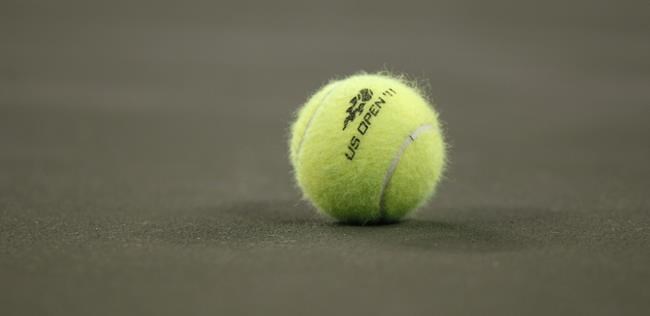
FILE = A tennis ball on the court during the first round of the U.S. Open tennis tournament in New York, Tuesday, Aug. 30, 2011. Casey Kania, an American tennis player who competed for the University of North Carolina, was suspended for two years after testing positive for marijuana during an ATP Challenger tournament in August 2023, the International Tennis Integrity Agency announced Tuesday, Feb. 27, 2024. (AP Photo/Charles Krupa, File)
February 27, 2024 - 10:32 AM
LONDON (AP) — A low-ranked American tennis player who competed for the University of North Carolina has been suspended for two years after testing positive for marijuana during an ATP Challenger tournament, the International Tennis Integrity Agency announced Tuesday.
The ITIA said Casey Kania's in-competition urine test contained cannabis in August 2023 at Cary, North Carolina, where he lost in the doubles quarterfinals. He is a 21-year-old with a career-high doubles ranking of 1,317th and $482 in career tennis earnings, according to the ATP website.
The tour's site shows that all of his ranking points and all of that prize money were earned during the lower-tier tournament in Cary — and everything he accumulated there must now be relinquished, the ITIA said.
As a college sophomore at UNC last year, Kania received an at-large bid to the NCAA doubles championship and lost in the round of 32, according to the college team's website.
The news release Tuesday from the London-based ITIA said Kania was unable to show he bore no fault for the violation, but the agency said it did accept that the player “did not intentionally breach the provisions” of the sport’s anti-doping program. That was the reason for a two-year ban, the ITIA said; an intentional violation is punishable by a four-year suspension.
Kania’s period of ineligibility began on Feb. 2, when the ITIA's decision was issued, and will expire on Feb. 1, 2026. His results, prize money and ranking points from the Cary event, and any tournament after that until now, are forfeited.
During a suspension of this sort, a player is barred from playing in — or even attending — any tennis event sanctioned by the ATP men's professional tour, the WTA women's tour, the International Tennis Federation or the organizations that run the four Grand Slam tournaments.
___
AP tennis: https://apnews.com/hub/tennis
News from © The Associated Press, 2024